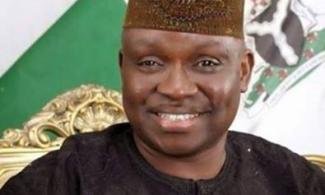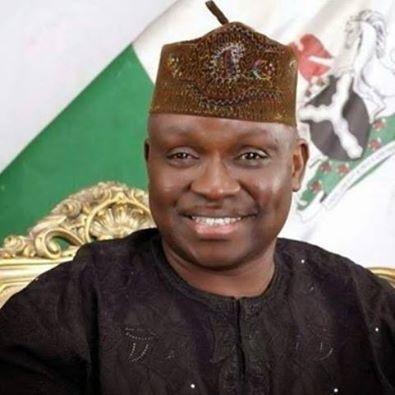
Our earlier story of February 5, 2014, “How Obanikoro, Fayose, Chris Uba And General Olukolade Rigged Ekiti Governorship Election In Collusion With The Nigeria Army,” unveiled clearly how the Peoples Democratic Party “won” that election.

The audio recording on which it was based was surreptitiously made by Captain Sagir Koli of the 32nd Artillery Brigade stationed in Ekiti State who accompanied to the meeting the military general in charge of the Ekiti plan. He has since left Nigeria in order to protect his life, leaving behind the patriotic body of work behind this story.
A close analysis of the audio of the Ekiti election eve meeting of 20 June 2014 meeting between the implementers of the rigging plan shows how easy rigging an election can be once it has the right mix of executive and security collusion. It also underlines the arrogance and impunity with which electoral fraud may be carried out.
At the meeting were the following: Ayo Fayose, the Peoples Democratic Party (PDP) candidate; Senator Musiliu Obanikoro, at the time the Minister of State for Defence; Senator Iyiola Omisore; Caleb Olubolade, the Minister for Police Affairs; Brigadier General Aliyu Momoh, and one “Honorable” Abdul Kareem, said to be a federal legislator.
Fayose, understandably, was present in his own interest, as the man the PDP wanted to put into Government House. The audio published here shows him in that role, exuding a blend of arrogance and confidence. He speaks with authority, bullying and intimidating Brigadier-General Momoh.
“We agreed in Abuja on the modalities to work,” the governor-to-be brags. “We agreed on a sticker, that any vehicle you see that sicker, you allow that sticker. That sticker is on those vehicles his own was sent to him, mine was sent to me. The one by SSS was given to me to give to them; there is no vehicle that left this place without that sticker.”
Obanikoro establishes the link of the group with the executive branch, pointing out that he was present at the behest of President Goodluck. “Am not here for tea party,” he announces. “Am here on a special assignment by the President.”
That assignment: to ensure that Fayose became the governor of Ekiti State by foul means. Omisore, a former Senator and former Deputy Governor of Osun State, was a candidate for the Osun election that would follow Ekiti’s. He seemed present to ensure success of the plan, perhaps in preparation for his own enthronement in his state thereafter.
The rest of the cast seemed to be the finely-honed tools of the operation:
General Momoh, Commander of the 32nd Artillery Brigade in Ekiti, representing the Chief of Staff of the Nigerian Army, and therefore the Nigerian military, in a partisan effort to rig a gubernatorial election.
Olubolade, the Police Minister, representing the Police Force, to make sure the Police did the bidding of the Presidency, and therefore the PDP, in a partisan effort to rig the gubernatorial election.
Obanikoro, having established that he was on the President’s special mission, speaks authoritatively, threateningly, even presidentially:
“I want him picked up [arrested) in the morning!” he says of Bimbo Daramola, [Governor Kayode Fayemi’s Campaign Manager]
“You can’t get promotion without me sitting on top of your military council,” he tells General Momoh. “If I am a happy man tomorrow night [after electoral victory), the sky is your limit.”
General Momoh demonstrates how Nigeria’s military has become not only the fetchers and carriers for the political class, but also its whipping boy. He is the clearest lesson yet why the Nigerian army seems to have lost its way.
“Chief of Army Staff called me,” Fayose tells General Momoh. “He told me, you are in safe hands…[General Momoh] would perform and if you have any issues, call me. He told me and I have made it clear to him [Chief of Army Staff] that I am Jonathan for this election.”
Fayose clearly had been given the maximum authority at the highest level to do whatever he needed to do to become Governor of Ekiti.
General Momoh, apparently clear about his orders emanating from the highest levels, was putting in his shift.
Among other things, he reassures his handlers, “We have strike force…We can start arresting [APC members] in the afternoon…I have almost 40 solders after deployment…We have done a lot of arrest.”
There are arguments running through the audio that General Momoh is not doing enough for the cause, that he does not jump quickly enough when ordered. When he appears to respond, he is roundly cut down.
“Don’t talk to me anyhow,” Abdul Kareem tells him at a point, “Who are you that I am insulting you? If I am in the military, I would be a brigadier or general today…”
“General, relax, sit down,” Olubolade tells him. “You are a soldier man. You are working for us…”
Fayose tells him, “Brigadier-General, I was governor of this state 12 years ago, you [were] probably a captain or major [at that time]…When you talk to this man he would argue from morning to night…My younger brother retired in the army as Brigadier General, when you explain to this man, its argument, argument, argument…”( SaharaReporters established that an elder brother of Mr. Ayodele Fayose named Tunde Fayose, retired as a Brigadier General in the Nigerian Army.
Obanikoro says to the other about General Momoh: “Let us make progress, give him instructions on what we want him to do, let him go and do it. Let us monitor him, and make sure those things are done…”
And directly to the General, he says, “The idea of [our] calling you and not getting reactions, we have to stop that now. You must bring that to an end. When we call you, within the next 5-10 minutes, we need to know what has been done about it…”
Fayose also reads General Momoh the riot act, in the process revealing the length and breadth of the rot of election rigging.
“My people cannot be following you about,” he warns the general. “We don’t follow IG about, we don’t follow police about. The OC MOPOL of this state is working for us, we don’t follow him about. When we call him one hand [and say] ‘we have this problem’, he settles it immediately. Last night, we told him this is happening around the Government House, he cordoned off all the four entrances…”
It is also of great significance that in the middle of the brouhaha about the performance of General Momoh, Fayose says, “We have to call the President and let him know. These people are doing some things.
They would not even serve the police that want to help us. We can’t continue like this!”
With that remark, Fayose confirms that President Jonathan is at the heart of their plan, and can be briefed at any time, perhaps for further resources.
This audio-drama restates the Nigerian electoral equation: that executive power and considerable resources are often used to subvert the will of the people. Here now is proof, finally, that not only was the Ekiti gubernatorial election June 20, 2014 rigged aforethought, it was rigged using the entire weight of federal power, with the Nigerian Army and the police involved in all kinds of illegalities.
The dramatis personae in this embarrassing plan are clear, from President Jonathan down through the PDP machine, but would be expected to attempt to deny everything.
But we have proof, here, about how the Ekiti governorship, on the back of the fable of “stomach infrastructure”, was thoroughly rigged: a plan that had probably been used in the past, and may be used as a model for future elections.
The question is: where is Nigerian law, especially when it is so roundly slapped in the face?[soundcloud]http://saharareporters.com/2015/02/05/minister-obanikoro-senator-omisore-gov-fayose-and-brig-general-momoh-ekiti-guber-story[/soundcloud]
Listen to the evidence as published here, and take a stand.
[soundcloud]https://soundcloud.com/saharareporters/secret-meeting-that-led-to-the-rigging-of-ekiti-gubernatorial-for-fa/edit[/soundcloud]